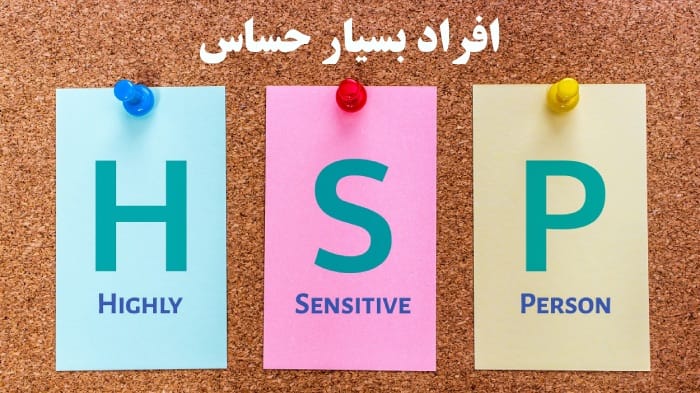
Blog
Highly Sensitive People (HSP)

The term “Highly Sensitive Person” was first introduced by psychologists Elaine Aron and Arthur Aron in the 1990s. Elaine Aron addressed this concept in her book titled The Highly Sensitive Person, published in 1996, and since then interest in this concept has increased. Highly Sensitive Persons (HSPs) have greater emotional sensitivity and respond more strongly to external and internal stimuli such as pain, hunger, light, and sound. They experience a more complex inner life. This, in turn, can cause highly sensitive individuals to suffer more intensely from emotional disorders such as depression and anxiety.
فهرست عناوین
ToggleCharacteristics of Highly Sensitive People
- Highly Sensitive Persons (HSPs) react to various stimuli with special sensitivity, reflecting the complexity of their behavior. These individuals tend more than others toward analytical thinking and direct understanding, which helps them perform well in social gatherings and in interactions with others.
- Sensitive individuals need time to make their decisions. This need for time is due to their desire to make the best decisions so they do not regret them later. Therefore, if you want to ask these individuals for services, you should consider that they need time to make the best decision.
- An interesting characteristic of sensitive people is their logical reasoning. They try to align their reasoning with strong logical arguments and then, by comparing different matters, make the right decision. This logical reasoning and effort to make correct decisions is one of the important features of sensitive people.
- Highly Sensitive Persons (HSPs) avoid impulsive and unplanned actions that may lead to regret and trouble. They require precise planning and place great importance on details.
- HSPs process their sorrows more deeply. They tend to examine and analyze issues from different angles, which may result in a more painful experience.
- People with stronger subconscious tendencies move toward deep analysis. They pay great attention to details that many ordinary people overlook. This trait may lead individuals toward more creative pursuits like art. In other words, when examining artists, traces of HSP can be observed in them. Attention to detail and valuing precise processing of details draws people toward poetry, literature, painting, music, and other arts.
- These individuals show great sensitivity to small details and can pay attention to issues that many people overlook. If they do not face disorders, they can create masterpieces, but
- In the presence of disorders, they may be guided toward different paths. These individuals are sensitive to others’ looks, expressions, and faces, and in their interactions with others, they perceive deeper aspects of issues.
- They can easily recognize your weaknesses and help you improve them.
- These individuals have a high listening ability and can listen to you empathetically, a skill that is very difficult for ordinary people. They are able to guide you and help you on your path.
HSPs are highly sensitive and emotional people. They have a high capacity for feeling love and affection and are known as honest, truthful, and trustworthy individuals. - Additionally, because of HSPs tendency to repress their feelings and thoughts, they may harbor deep resentments that come out suddenly and unexpectedly. They may keep their negative feelings bottled up for a long time and not express them when confronted with the person in question.
- They have a good ability to understand the feelings and experiences of others and show behaviors in social interactions that help with understanding and empathy.
- Due to their high sensitivity, HSPs may be prone to some mental illnesses. This does not mean they necessarily develop a mental illness, but indicates they might be more exposed to such conditions because of their sensitivity.
- Because they hold sorrow in their minds longer, HSPs may more quickly and intensely suffer from stress, anxiety, and worry.
- Highly Sensitive People (HSP) react to various stimuli with special sensitivity, indicating behavioral exaggeration compared to others.
- They use their hearts and feelings more than logic to guide their lives.
- They seek positive inner feelings and need to be happy constantly so that their life is filled with joy. Due to their high sensitivity, these individuals quickly flee from negative phenomena and keep them away from their lives.
- They deeply feel matters and show more emotional reactions.
- HSPs are perceptive and often get lost in thought to reach a deep understanding of issues.
- They are very empathetic and try to help others because, due to their deep feelings, they establish a kind of empathy with others.
- They have little interest in team sports and prefer individual sports. However, if a person has received parental support and encouragement during childhood, they can also participate in and enjoy team sports.
- These individuals need more time for decision-making because they try to consider various aspects in their decisions, overlapping in this regard with perfectionists. It is worth mentioning that sometimes decision-making becomes so difficult for an HSP that they prefer to do nothing.
- They are detail-oriented and meticulous and spend a lot of energy on small surrounding matters.
- HSP individuals are very conscientious and responsible.
- They behave well with others and try to act thoughtfully so as not to upset or hurt others.
- If, for any reason, they stray from the path of politeness and courtesy, they feel guilt and sadness.
- Due to excessive sensitivity, they are prone to anxiety and depression, and when they do not feel safe in an environment, they become anxious.
- They get distressed from watching action and horror movies.
- If they have to engage in teamwork or group work, they perform very successfully, due to their empathy, attentiveness, and precision.
- They prefer to use conversation and compromise to solve problems and avoid arguments and disputes.
suggested article: mood disorders

Prevalence Rate of HSP in Human Society
According to Aron’s research and studies, approximately 15 to 20 percent of the human population are recognized as Highly Sensitive Persons (HSP). This group of individuals, with their unique characteristics, respond more intensely and deeply to external and internal stimuli, which may affect their daily lives. Understanding the community of highly sensitive individuals helps us identify and implement the best solutions and strategies to maintain the mental and psychological health of this group.
Dr. Aron says in his book The Highly Sensitive Person that individuals with special sensitivities experience different levels of self-esteem depending on the type of society they live in. If a society does not value these individuals due to their behavior and personality model, their self-esteem suffers.
In societies where these individuals repeatedly hear phrases like: “You are too sensitive,” “Try not to be so sensitive,” and so on, they experience multiple problems.
Is HSP a Mental Disorder?
Sensory Processing Sensitivity (HSP) is a personality trait studied by Dr. Elaine Aron and other researchers. This trait gives individuals a greater ability to respond to environmental influences, including both positive and negative stimuli. However, being HSP does not mean having a mental disorder and should be considered an evolved personality characteristic.
Highly sensitive people may have a higher ability to detect warning signs that others overlook. They may react more intensely to social information and the emotions of others. In other words, sensory processing sensitivity may help individuals gain a deeper understanding of their environment and the feelings of themselves and others.
However, it is important to note that sensory processing sensitivity alone should not be considered a mental illness or disorder. Rather, it should be regarded as a natural personality trait that may have its own advantages and disadvantages in certain situations. This highlights the importance of better recognition and understanding of highly sensitive individuals to facilitate improving their life satisfaction.
Suggested article: anxiety disorders

What are the factors affecting the occurrence of HSP?
The factors that contribute to the development of sensory processing sensitivity (HSP) in individuals are complex and multifaceted. Generally, research shows that high sensitivity has genetic roots, and certain types of genes are associated with this personality trait. However, environmental factors may also play an important role in this process.
Based on available evidence, an individual’s early childhood experiences may influence the genes related to sensory processing sensitivity. In other words, these experiences may have an epigenetic effect on the genes associated with sensitivity and lead to the development of this personality trait in the person.
Considering these points, it is clear that genetic and environmental factors converge to shape sensory processing sensitivity in individuals. This indicates the complexity and interaction of various factors in the development of this personality trait and calls for further research in this area.
Having good parents is very important for HSP individuals because the type of parental reactions and feedback determines their levels of self-esteem, depression, and anxiety. On the other hand, if parents constantly blame the individual for being overly sensitive, they will suppress their talents. It is also worth noting that excessive and overprotective support during childhood can cause these individuals to lose the ability to adapt and cope with current conditions.
Sepidaran Ravan Complex can provide you with appropriate diagnosis and solutions by providing online and in-person psychological services. Contact us for a free initial consultation.
برای مشاوره رایگان و رزرو وقت (یا اگر تماس گرفتید و قادر به پاسخگویی نبودیم) شماره تماس خود را وارد کنید. ما به زودی با شما تماس می گیریم!



